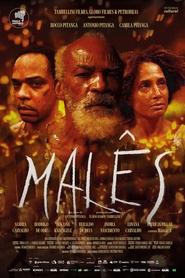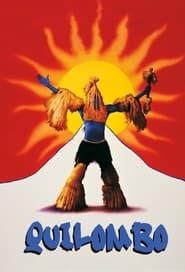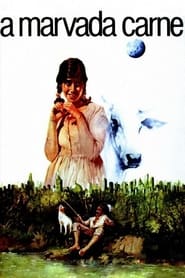detail profile pedro farkas
Peran Yang Di Mainkan Pedro Farkas
 Based on historical facts the film...
Based on historical facts the film...Malês 2024
Based on historical facts, the film portrays the largest slave rebellion in Brazilian history, the Malê Revolt. The uprising mobilized the black population in the streets of Salvador against slavery in 1835. After the failure of the revolt, the protesters were harshly punished and repression against black people in Brazil increased.
 So Paulo 1984 Agostinho an old and...
So Paulo 1984 Agostinho an old and...Uma Noite Não é Nada 2018
São Paulo, 1984. Agostinho, an old and tired Physics professor, is married to Januária, a retired school principal. In his classes, he begins to feel attracted to one of his students, Márcia, an HIV positive teenager. Quickly, the attraction of the two turns into an impossible love.
 Marked by losses and mismatches Joss...
Marked by losses and mismatches Joss...Paradise Lost 2018
Marked by losses and mismatches, José's eccentric family seek to be happy while locked in Paraíso Perdido, a nightclub that has stopped in time, where they sing popular romantic music.
 A series of crimes against redheads...
A series of crimes against redheads...The Devil's Scarab 2016
A series of crimes against redheads scares the people from a little town. After the death of his brother, the 13 year old Alberto decides to investigate what is happening and is helped by the experienced but forgetful Inspector Pimentel.
 Covering the last years of the...
Covering the last years of the...Zuzu Angel 2006
Covering the last years of the famous Brazilian fashion designer in her doomed quest for justice, Zuzu Angel follows the case of her activist son Stuart's arrest, torture, murder, and subsequent corpse disposal by the military forces in early 1970s Rio de Janeiro, during the darkest era of Brazilian military regime and media censorship.
 The story of Orisbela a young...
The story of Orisbela a young...Desmundo 2002
The story of Orisbela, a young and religious woman who comes from Portugal to Brazil to marry Francisco de Albuquerque, a rude sugar-cane plantation owner, in 1570.
 Portraits and excerpts from Brazilian films...
Portraits and excerpts from Brazilian films...Celebração - 100 Anos do Cinema Nacional 1997
"Portraits and excerpts from Brazilian films from all times. Actors, directors and images that affirm cinema."
 Henry Czerny plays American journalist Michael...
Henry Czerny plays American journalist Michael...The Interview 1995
Henry Czerny plays American journalist Michael Coleman, a strung-out expatriate writing for a Brazilian newspaper. His professional obsession is Father Stephen Louis, a mildly popular and charismatic priest who has been the major political opponent of the greedy and ruthless landowners of the Bahia region. Mysteriously, the usually outspoken Father Louis has been silent for three months. With the Brazilian Congress about to vote on a major land-redistribution bill that could potentially tip the balance of power even further, Father Louis’s support of the peasants and his condemnation of the landowners is more important than ever. Coleman sets out alone for the politically unstable Bahia region to capture a highly anticipated interview with the elusive priest.
 A photojournalist goes to Brazil to...
A photojournalist goes to Brazil to...Boca 1994
A photo-journalist goes to Brazil to investigate a savage crime boss. She becomes infatuated with the story.
 On the eve of an important...
On the eve of an important...Manobra Radical 1991
On the eve of an important surfing championship, a group of young friends travels along the Brazilian coast with the intention of training hard and having a chance to become professional in the sport. However, along the way, Guel, a surfer bum, falls in love with a rich girl.
 According to an Amazonian legend every...
According to an Amazonian legend every...The Dolphin 1987
According to an Amazonian legend, every month, during the full moon, a Brazilian fishing village receives a mysterious guest: the Boto, who transforms into a human to seduce and be loved by women and hated by men. One of her conquests is the daughter of a fisherman, who has a son with the Boto. He constantly reappears to seduce her, and even when she marries, he continues to look for her. This provokes the ire of the husband, who wants to kill him anyway.
 Quilombo dos Palmares was a reallife...
Quilombo dos Palmares was a reallife...Quilombo 1984
Quilombo dos Palmares was a real-life democratic society, created in Brazil in the 17th century. This incredibly elaborate (and surprisingly little-known) film traces the origins of Quilombo, which began as a community of freed slaves. The colony becomes a safe harbor for other outcasts of the world, including Indians and Jews. Ganga Zumba (Toni Tornado) becomes president of Quilombo, the first freely elected leader in the Western Hemisphere. Naturally, the ruling Portuguese want to subjugate Zumba and his followers, but the Quilombians are ready for their would-be oppressors. The end of this Brave New World is not pleasant, but the followers of Zumba and his ideals take to the hills, where they honor his memory to this day. Writer/director Carlos Diegues takes every available opportunity to compare the rise and fall of Quilombo with the state of affairs in modern-day Brazil.
 In the 19th century a country...
In the 19th century a country...Innocence 1983
In the 19th century, a country girl is seduced by a young doctor who's staying at her house for a few days, caring for her, and tries to hide the forbidden romance from her father, who disapproves of the relationship.

 A group of friends come of...
A group of friends come of... Four people with different values and...
Four people with different values and... A detective is hired by a...
A detective is hired by a...
 Nh Quim has only one dream...
Nh Quim has only one dream... A fragmented style patchwork of interviews...
A fragmented style patchwork of interviews...